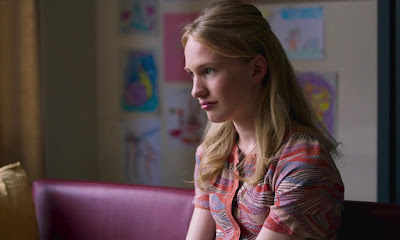Lara, a 15-year-old girl who was born in a boy's body, is committed to becoming a professional ballerina.
It's the world we live in now, that there will be controversies about the cast for the majority of films coming out. Too caucasian, too ethnically diverse, not the right sexuality, improper gender, it's like we have forgotten that back in ancient Greek, Roman, and Medieval times, only men could become actors, with women's roles played by men or boys. The whole idea of acting is to roleplay a real or fictitious person. It shouldn't matter who is cast in the role. All that should matter is the strength of their performance.
In that regard, Victor Polster puts on a masterful performance as Lara, a person that identifies as a woman, but was born in a man's body, and is awaiting surgery to correct those changes. You can feel that insecurity and frustration being conveyed despite Polster's performance being largely devoid of dialogue. It is a little odd that Lara's character is so submissive--allowing the male figures in her life to speak on her behalf so often--though that may have been playing to Polster's strengths as his ability to show emotion through his face and actions is exemplary. Every wince, every moment of hesitation, every longing stare, speaks volumes.
The film avoids the usual tropes of the coming-out scenario starting later in the transitioning process focusing on gender dysphoria and the resentment and bitterness that it creates toward's Lara's own body, as she attempts to gain acceptance to a prestigious ballet academy, explore her romantic urges, and discover her orientation.
In general, the film is supportive of Lara's transition. Her father Mathias is extremely sympathetic and understanding, and other people her age are largely apathetic. It creates a film where there are no true antagonists. In fact, the only source of conflict in the film comes from Lara herself, and her impatient personality traits. Due to this, the film does lack a strong narrative direction, instead, it feels like a passive observation of a nervous breakdown, and to that effect, the film feels like it lacks a satisfactory conclusion.
Be warned that there is a scene involving self-harm in the film that, while not necessarily graphic, is emotionally vivid, and will have many members of the audience cringing in sympathy, no matter how little empathy they feel towards the character. These scenes could be distressful for those that are going through a similar transitioning experience.
There are scenes with nudity, but it is tastefully done and contributes to the context of the story as there is a huge emphasis on the outward physical appearance of Lara--whether it be breasts, shoulders, feet, or genitalia--and it does create a one-dimensional perspective. Even the arc involving the ballet academy places most of the emphasis on Lara's physical features. This focus on appearance does help to drive home the discontent and level of depression that Lara feels as she struggles for acceptance from the academy, and herself.
While there are definitely some aspects of the film that could be improved, it nonetheless has good intentions and is refreshing to see such support for the lead character from the minor cast. The film relies heavily on Polster's performance and he does the role justice.



